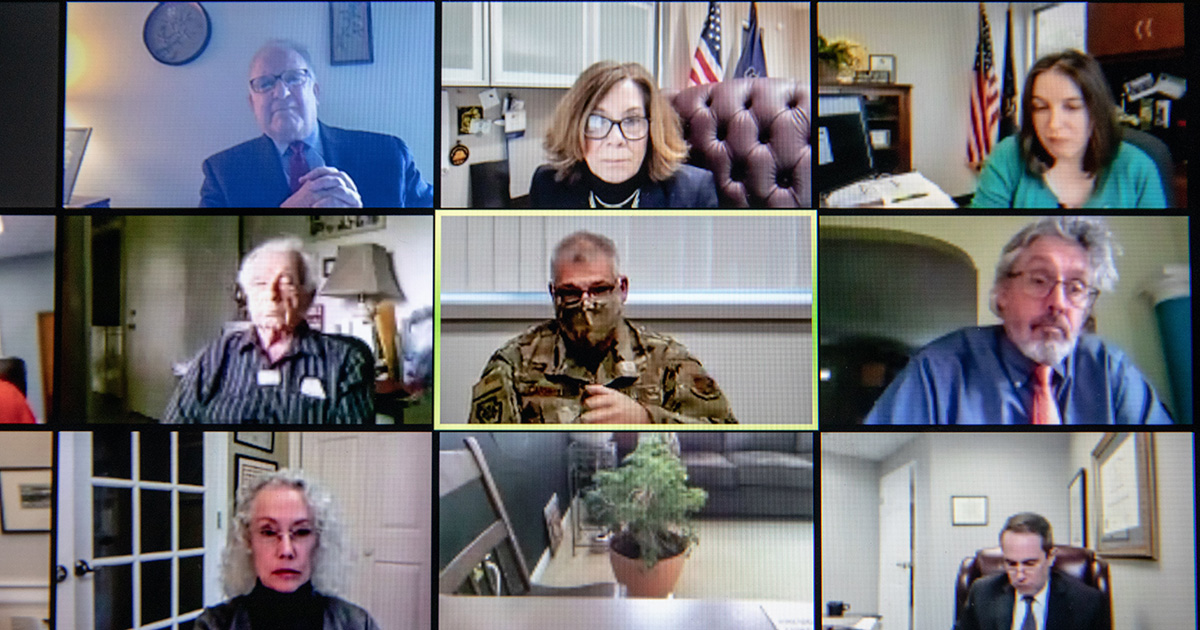
Harrisburg, May 6, 2020 − The state Senate Democratic Policy Committee held an online hearing today that focused on the pandemic’s impact on residents and employees in Pennsylvania nursing homes and state veterans’ homes.
According to the state Department of Health, nursing home residents make up approximately two-thirds of COVID-19 deaths in Pennsylvania.
Sen. Lisa Boscola (D-Northampton/Lehigh), who chairs the committee, noted, “Data demonstrates that nursing home residents and employees are amongst the most susceptible to being infected with Covid-19. It is clear that even as we flatten the curve and open parts of the commonwealth, we must do more to help these homes improve their preparation and response strategy, step up testing, obtain crucial protective equipment and take whatever steps necessary to protect their residents and employees.”
“This horrific pandemic has exposed numerous critical problems facing nursing and veterans’ homes,” Iovino said. “Based solely on the alarming number of cases and deaths in these facilities, the state needs to do more to protect these residents and workers.”
Muth added, “This COVID-19 crisis has drastically worsened problems that have existed in these nursing facilities for years. When you combine such a vulnerable population with a workforce that is under-protected, understaffed and underpaid — you are inviting the kind of dangerous and deadly scenario that is currently playing out.”
As of today, the state’s 492 nursing and personal care home facilities had 10,010 resident cases of COVID-19, and 1,372 employee cases. Of the 3,116 coronavirus deaths reported statewide, 2,108 involved residents from such facilities.
“There are multiple challenges that long them care facilities are dealing with regarding their residents,” said Alex Metricarti, chief marketing and public relations manager, at Living Branches long term care center. ”We have to figure out how to balance safety and protection with being able to get something back to normal. Our residents are going crazy. They have been in their rooms way too long. They cannot see their families. They’re surrounded by people whose faces they cannot even see.”
Fran McDermott, whose mother contracted COVID-19 at the Southeastern Veterans Center in Chester County, expressed frustration with the center’s failure to contain the virus and lack of transparency. She said her mother was never isolated, despite having both roommates — who later died — on oxygen.
“Nurses have told me they were afraid to go to work,” she said. “A nurse exposed to COVID patients and having COVID symptoms was asked to keep working, a double shift. Personal Protective Equipment (PPE) was not always available. The building was understaffed and we found out through a Philadelphia Inquirer article that the National Guard was called in to make up for the staffing shortfall.”
Major General Anthony J. Carrelli, who serves as the state’s adjutant general, discussed numerous steps administrators and nurses from state veterans’ homes (SVH) took to prepare, prevent and contain the spread of the virus.
“We are in the midst of an emergency, Major Carrelli said. “None of us have experienced anything like this in our lifetimes. Our National Guard is actively assisting homes on the verge of collapse, in dire need to regroup. The presence of the National Guard provides the facilities critical time to regroup its staff, PPE, and contracts to prepare to take on the next day. Everyone is doing the best they can. These are very challenging times, and the circumstances are far less than ideal. I am confident, however, that our SVH staff and national guard members are doing the best that they can every day. Their commitment, and the selfless care they bring to others is exceptional.”
Dr. Christina VandePol, who serves as Chester County Coroner, said the lack of testing has hampered her ability to determine if deaths are caused the virus or other diseases/events. She criticized the stated Department of Health for not even informing coroners and medical examiners about COVID-19 deaths.
“A closed system with no outside eyes and ears is a recipe for disaster for any vulnerable person, but that is what we now have,” VandePol added. “Facilities are on lock-down. Death certificates are being completed by facility employees. Inspections have been suspended. Ombudsmen and families are no longer allowed inside. An indicator of the lack of oversight is that the number of reports of elder abuse and neglect has dropped precipitously since the pandemic began.”
Today’s hearing follows a policy hearing last week that studied the impact of the pandemic on front-line, emergency response and essential workers. To adhere to pandemic social distancing guidelines, all hearing participants were linked remotely via the internet.
Those who testified included:
- Alex Metricarti, Living Branches, Montgomery County;
- Fran McDermott, mother of a PA State Veterans’ Home resident;
- Dr. Valerie Arkoosh, chair, Montgomery County Commissioners;
- Major General Anthony J. Carrelli, Adjutant General; PA Department of Military and Veterans Affairs;
- Major General (Ret) Eric G. Weller, Deputy Adjutant General for Veterans Affairs, PA Department of Military and Veterans Affairs;
- Andrew Ruscavage, Director of Veterans’ Homes, Department of Military and Veterans Affairs;
- Dr. Darryl Jackson, Medical Director, Bureau of Veteran Homes; and
- Dr. Christina VandePol, coroner, Chester County.
In addition to Muth, Iovino and Boscola, the following senators participated in the hearing: Senator John Blake (D-Lackawanna), Maria Collett (D-Bucks/Montgomery), Andrew Dinniman (D-Chester), Wayne Fontana (D-Allegheny), Larry Farnese (D-Phila.), Vincent Hughes (D-Phila.), Tim Kearney (D-Delaware/Chester), Street (D-Phila.), Steve Santarsiero (D-Bucks), Christine Tartaglione (D-Phila.), Anthony Williams (D-Phila./Delaware) and Lindsey Williams (D-Allegheny).
# # #
